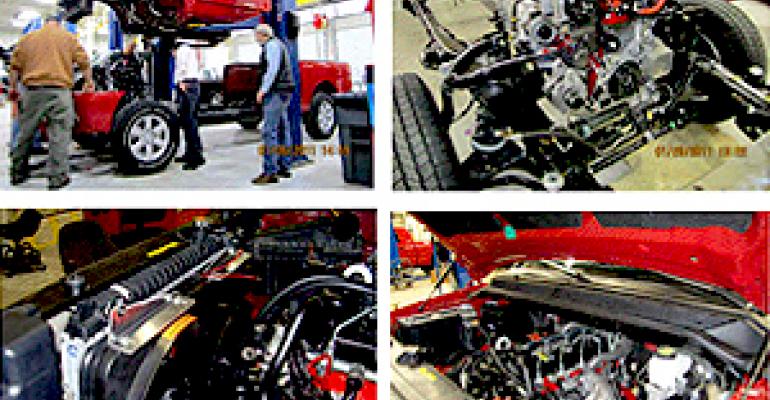
SEATTLE – Nissan’s 4-cyl. pickup-truck diesel demonstration project with Cummins and the U.S. Department of Energy is just an experiment, and the auto maker’s U.S. product chief says he is unsure if a light-duty truck needs such an engine.
A diesel engine is “not necessary” in such an application, Larry Dominique, senior product planner for Nissan North America, tells Ward’s in an interview here. “Heavy-duty trucks, you certainly do (need diesel),” he says.

Nissan was approached by the DOE and Cummins to co-develop a 4-cyl. diesel. When fitted in a Titan, the mill is targeted to achieve 28 mpg (8.4 L/100 km) and Tier-2 Bin-2 emissions standards.
While Dominique says it’s been a great learning experience, Nissan has not committed to using the powertrain in production. However, he calls it an “exciting idea” and says the auto maker is “trying to learn as much as we can from the relationship.”
Nissan has considered a diesel for the Titan many times over the years, at one point engaging Cummins about expanding their relationship (Cummins already supplies Nissan diesels for overseas commercial models).
Cummins also is the diesel supplier for Chrysler’s Dodge Ram.
The Auburn Hills, MI-based auto maker was to assemble the next-generation Titan off the Ram platform for Nissan, but the hookup became a casualty of Chrysler’s bankruptcy.
Cummins’ Wayne Eckerle, vice president-research and technology, told Ward’s last year he saw light-duty pickup diesels as essential, based partially on a projected drop in implementation costs.
Nissan had said a next-generation Titan could be expected by 2014. But, as he did last year, Dominique shies away from putting an introduction date on the vehicle, which Nissan now is developing in-house without the help of Chrysler.
The current Titan debuted in 2003 as an ’04. It has been a low-volume model for much of its life, selling below 100,000 units. The Ford F-150, in contrast, usually sells more than 600,000 units annually.
While a light-duty diesel may not be on Nissan’s table, Dominique alludes to a smaller, more powerful V-6, crediting Ford’s EcoBoost V-6 with changing the pickup-truck paradigm of ‘mine’s bigger than yours.’
“Who would have thought three years ago V-6 turbos would be 35% of Ford F-150 (sales)?” Dominique says. “I think truck buyers, especially when fuel prices have been up, are open to technology. They’re open to things five, seven years ago they would have said, ‘No way would I consider that.’
“Having somebody like Ford leading the way…I think is great,” he continues. “It opens up the door to us to look at alternatives, as well.”
While Nissan has struggled in the fullsize pickup sector, it does well among compacts with its Frontier model, the second-best-selling nameplate in Ward’s Small Pickup group after the Toyota Tacoma.
Dominique believes there is more upside for the Frontier, especially given the coming exit of Ford’s Ranger model.
“That’s a great opportunity for us” to grow sales and share, he says of Ranger’s pending departure.
Speaking to the sector, Dominique believes there is an opportunity to better distinguish compact pickups from fullsize models as a way to boost sales.
“Fuel efficiency is one of the ways to do that, price is another way to do that,” he says, adding that building somewhat smaller compacts also is a possibility.
“(The) compact truck has a future, but it could reinvent itself a little bit,” he says. “I think we as Nissan are well-positioned, because on a global basis it’s a very important part of our portfolio.”
Globally, Nissan has about 30% of the pickup-truck market, largely owing to its dominance in small pickups overseas, and driven by demand for the old, hard-body D21 (Navarra) and D22/D40 (Frontier) models.
Now the auto maker is deciding whether to go with a single global platform family for all its future compact models, Dominique says.




